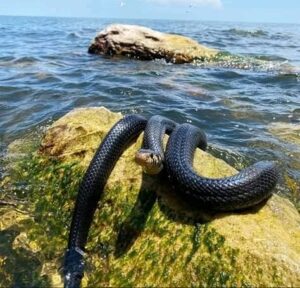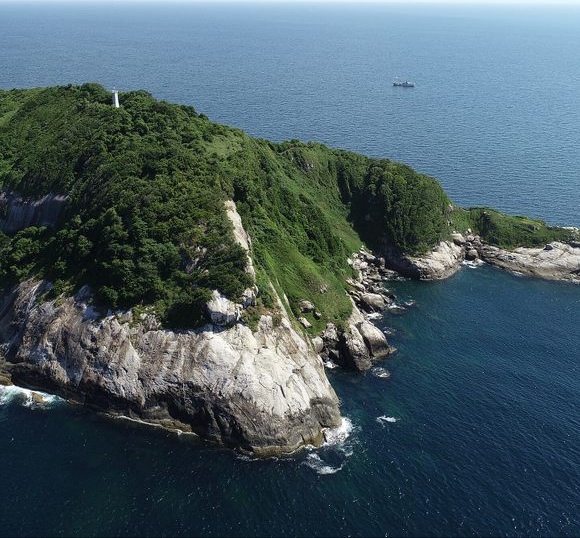By Felix Oketcho
Uganda the Pearl of Africa is very interesting with numerous attractions and stories.
Besides wild animals, unique birds, good weather, mountains and friendly people when you dig deeper you discover more.
One such spot we highlight is Musambwa Island. Musambwa island in Uganda is one of the strangest and weirdest places on Earth. Surrounded by the serene waters of Lake Victoria, it’s a gem of mythical wonders. It boasts of a cultural mosaic fused with superstitions that have fascinated visitors from around the world for generations.

Musambwa islands are three small rocky islands that lie in the Lake Victoria. About 3 hactare and between them is the smallest which are just rocks jutting out of the water with little vegetation.
Musambwa is inhabited only by men and snakes. Women are not allowed to stay there, and when they visit, they cannot spend the night there.
Musambwa, which means spirits in the local dialect, is also home to over 150,000 birds.
Here, there’s no cutting down of trees, no killing of snakes, no rearing of sheep, and no sexual intercourse. Birds, too, shouldn’t be killed, and their eggs must not be eaten. There are more than 30 species of rare birds and reptiles. It’s also the largest breeding area for gray-headed gulls in Africa.
The island, which can be accessed through Malembo or Kasensero landing sites in Kyotera District in central Uganda, has about 120 men.The conservation of the island’s ecosystem is grounded on cultural beliefs, values and range of intricate taboos.
Some residents say the island has a spirit that often manifests in the night in form of a beautiful tall woman dressed in white clothes. They say the spirit is jealous of women and that’s why it doesn’t allow them to reside on the island.
Many respondents spoke of an incident that happened in the 1990s when a couple visited the island and engaged in sexual intercourse. It is said that the outcome was disastrous, as the waters around the island turned turbulent, with strong winds hence killed the couple.
There’s also a belief that spirits manifest in the form of rock cobras. To the residents, the rock cobras are not ordinary snakes. First, it is believed that the cobras do not attack, except when disturbed. It is also believed that they are not poisonous.
Places of worship, mostly for those praying for blessings, are common on the islands.
There’s a huge Mukokoowe tree (Ficus branchypoda), which is the main shrine.
The Mukokoowe tree has both cultural and religious importance Culturally, the tree hosts the main shrine at the main Musambwa islet. There is a shrine under this tree where people go and pray for different things – healing and blessings. The tree provides a breeding space for birds which can lay their eggs on the ground. They make their nests in the branches of the Mukokoowe tree, especially during the breeding season.
Due to its vast congregation of bird species, it was designated as a Ramsar Site in 2001. These include grey-headed gulls, Egyptian geese, black songbirds, great cormorants, talking birds, weaver birds, water crane birds, black herons, little egrets, black crakes, hornbills, sacred ibises, sandpipers, pelicans, among others. In addition to the birds and humans, the Islands also harbour rock cobras that freely live with humans – a relationship embedded in taboo.
Whereas in many ecosystems, human nonhuman relationship is exploitative, Musambwa is unique in such a way that humans relate with other species as stewards. They do appreciate the existence of snakes and birds as a vital component of their natural environment. As such, they protect the non-humans from any possible persecution through a system of cultural norms and other rules and regulations created on the island through support from environmental conservation organisations.
“Bad environmental practices recorded included eating of birds and their eggs, trapping monitor lizards for food and making of drums, among others. Such practices caused a significant reduction of these species. However, with the blending of modern conservation practices and cultural practices, the population of non-humans, especially of birds, has significantly increased.
Musambwa islands hold a substantial tourism potential that is capable of contributing significantly to the development of Uganda through tourism-related interventions.
With the vast bird congregation and the presence of snakes, such an ecosystem needs to be supported by promoting and popularising it and putting in place certain facilities- especially sanitary. A concerted effort of state and non-state actors ought to come into play if this place is to be boosted into a vibrant tourism destination.
Musambwa Island, the world’s largest breeding colony for tens of thousands of grey-headed gulls, in Uganda’s Southern region. The chirping birds are uninterrupted as they happily jump from corner to corner of rocks and trees. A fleet of gulls takes to the air while others remain to guard their nests, eggs and the babies.
A wild wave emerges from Lake Victoria, the largest lake in East Africa. It advances at a terrifying speed towards the shoreline. It smacks the rocks and splatters over several breeding grounds of different bird species leaving them flooded.
The adult gulls are forced to relocate to higher grounds (rocks) abandoning their young ones and unhatched eggs. By now, the feeble attempts for the frightened lonely chicks to escape the emerging danger, are failing. The nesting birds near the rocks helplessly drown, while numerous ground nests and eggs are destroyed in a repeated episode of the wave.
Going around the rocks, you trip over dead gulls, little egrets, greater cormorant, long-tailed cormorant and the black crakes. A plain count of more than 80 eggs of different bird species and 110 dead birds scattered within an area of one acre, faintly gives a clear picture of the impact of the recently rising water levels and floods on the birds and the breeding territories.
Although the actual impact is not yet known, Enoch Ntale, a conservationist and tour guide at the Island, roughly estimates nearly 1000 eggs were destroyed and over 500 birds, especially nestlings, killed by the floods.
“This is a natural calamity and we can do little about it. However, we expect to determine the impact anytime. But what I know, the number of birds will reduce as a result of the floods,” he noted.
Musambwa island is occupied by approximately 100 men who peacefully reside with different species of reptiles especially snakes that are commonly seen in people’s houses as well as sharing beds with the men. Emmanuel Katongole 60 years old, had just arrived on Musmbwa island, he woke up one night, to find, there was a huge poisonous black cobra under his pillow. He then screamed for help, only to be rebuked by neighbors for scaring off good luck. Musambwa residents believe their island is full of spirits which must appear in form of snakes. So in Luganda, Musambwa means spirits.
Musambwa island boosts one of the highest morality rates in the world given that no one can have sex there or else the spirits will humiliate him/ her and the entire population. This has saved the inhabitants from the deadly sexually transmitted diseases like AIDS that is common on other islands on the lake.
There are many activities on this lake which include nature walk along the rocky island, bird watching, seeing reptiles, sport fishing and guided water boats and many more. The vegetation on this island is mainly shrubby and stunted trees mainly ficus and the shore lines are rocky.
Besides over 2000 snakes residing on the island, there are reptiles and a very large number of bird species, it is also a breeding site for long tailed cormorant, greater cormorants and little egret. The different bird species include black crake, spur winged plover, grey heron, yellow billed duck, African fish eagle, pied king fisher, Squaco heron and many more that can be viewed with ease than other birding sites where one has to use binoculars.
The Musambwa island is also known for rock pythons, cobras, vipers, and monitor lizards. These live with men pleasantly, they don’t kill snakes and reptiles do not bite them. There is a myth in this place says that a female and a male spirit came to the lake and separated, therefore the male spirit occupied the busier island which led to prohibition of women and sex on this island in order to please the gods/spirits. Therefore, no woman will be allowed on this island and men who wants to have sex, goes to the mainland which is about 10 km away, taking approximately 1 hour by motorized boat or have to travel to neighboring islands if they need sex. Anyone who annoys the spirits will attract punishment on the whole community on the island and must be chased away from Musambwa island
Musambwa island is one place, a tourist needs not to miss to discover the superstitious island.Go discover the unique culture of Uganda the Pearl of Africa.



